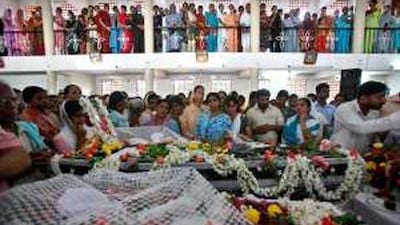At the Emirates English Speaking School in Dubai, staff tried to explain the death of five-year-old Ashton Saldanha to his classmates. At the same time, 2,500km away in the Indian town of Kasargod, residents mourned the deaths of 50 of its people, and braced for the inevitable financial consequences of losing so many breadwinners.
One day after the crash of Air India Express Flight 812, the accident touched the UAE and Kerala in ways large and small yesterday, underscoring the critical ties between this country and the Indian state. In all, 158 people were killed early on Saturday when the Boeing 737-800, flying from Dubai, rolled off the end of the runway in Mangalore, crashing into a valley below. Yesterday, investigators found the "black box" containing the aircraft's cockpit voice recorder as they continued to piece together the clues to why and how the relatively new plane touched down about 2,000 feet past the point where it should have.
According to the Indian government, accident investigators from the Directorate General of Civil Aviation said it might take about two weeks to analyse the recorder, which had been damaged by fire. There were conflicting reports as to whether the aircraft's main flight data recorder had been recovered. "It is not possible to give any reason for the crash unless we find the black box," Peter Abraham, the Mangalore airport's director, told Reuters news agency.
An American forensic team arrived in India to help the investigation into the crash, officials said. Eight passengers survived the crash, seven of whom remained in hospital. For the rest, tragedy touched across continents. In Mangalore, relatives faced the grim task of identifying the remains of their loved ones. Last night, 12 bodies remained unidentified. Authorities told relatives that DNA test results would take 48 hours.
For those whose loved ones had been identified, cremation ceremonies were held. Air India was offering relatives free transport to Mangalore. Family members from around the region had also converged on the city. Little Ashton Saldanha had been travelling on the stricken flight with his father, Denis, to visit his mother. SSU Tabrez, the principal of Ashton's school, called his death "tragic". He said Ashton had a bright future.
Anand Singh, the district collector of Kasargod, said the community was devastated by the loss of life. Many of the dead were breadwinners who had business interests in the UAE and were sending money home, he said. Here, their friends and relatives were in shock. Traders at Rolla Square Market in Sharjah said at least eight of their number - all from Kasargod - died in the crash. Many others lost friends and relatives.
Mohammed Shammer, a salesman at a toy and garment store whose roommate, Mohammed Rafi, 22, died, said: "He was the sole breadwinner for the family." Mohammed Abdullah, 60, who had worked at the market's Hujoon restaurant for 15 years, also died. He had been going home to arrange his daughter's wedding. Customers of the restaurant left candles in memory of Mr Abdullah yesterday. Others who inquired after him cried when they were informed of his death.
"He was a man of huge responsibilities with a big family to support," said Fahad Manayath, a waiter at the restaurant. Although it remained unclear what had caused the crash, aviation experts in India were yesterday critical of its watch on safety and quality control. Staff training standards were also in decline, they said. A Ranganathan, an airline safety consultant and pilot instructor, said: "The crash was waiting to happen. Safety standards in Indian aviation have been on the wane for six years."
newsdesk@thenational.ae

